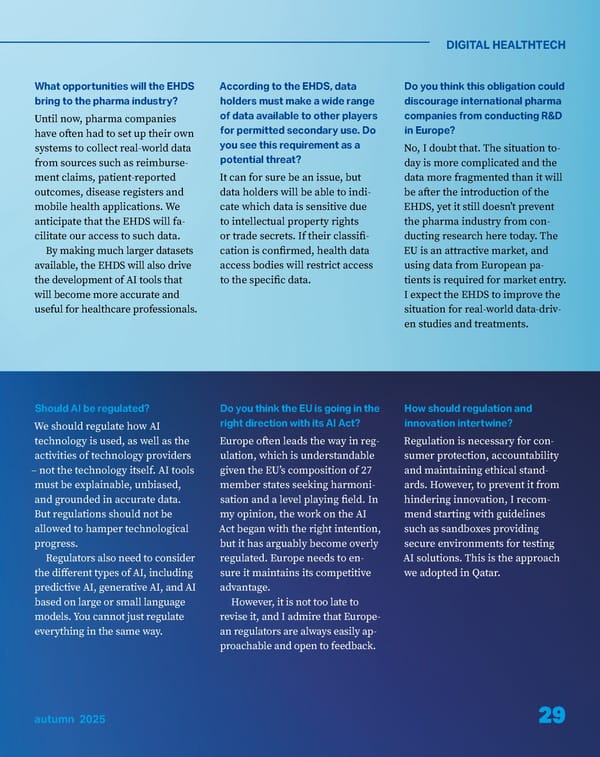29 autumn2025 What opportunities will the EHDS bring to the pharma industry? Until now, pharma companies have often had to set up their own systems to collect real-world data from sources such as reimburse- ment claims, patient-reported outcomes, disease registers and mobile health applications. We anticipate that the EHDS will fa- cilitate our access to such data. By making much larger datasets available, the EHDS will also drive the development of AI tools that will become more accurate and useful for healthcare professionals. According to the EHDS, data holders must make a wide range of data available to other players for permitted secondary use. Do you see this requirement as a potential threat? It can for sure be an issue, but data holders will be able to indi- cate which data is sensitive due to intellectual property rights or trade secrets. If their classifi- cation is confirmed, health data access bodies will restrict access to the specific data. Do you think this obligation could discourage international pharma companies from conducting R&D in Europe? No, I doubt that. The situation to- day is more complicated and the data more fragmented than it will be after the introduction of the EHDS, yet it still doesn’t prevent the pharma industry from con- ducting research here today. The EU is an attractive market, and using data from European pa- tients is required for market entry. I expect the EHDS to improve the situation for real-world data-driv- en studies and treatments. Should AI be regulated? We should regulate how AI technology is used, as well as the activities of technology providers – not the technology itself. AI tools must be explainable, unbiased, and grounded in accurate data. But regulations should not be allowed to hamper technological progress. Regulators also need to consider the different types of AI, including predictive AI, generative AI, and AI based on large or small language models. You cannot just regulate everything in the same way. Do you think the EU is going in the right direction with its AI Act? Europe often leads the way in reg- ulation, which is understandable given the EU’s composition of 27 member states seeking harmoni- sation and a level playing field. In my opinion, the work on the AI Act began with the right intention, but it has arguably become overly regulated. Europe needs to en- sure it maintains its competitive advantage. However, it is not too late to revise it, and I admire that Europe- an regulators are always easily ap- proachable and open to feedback. How should regulation and innovation intertwine? Regulation is necessary for con- sumer protection, accountability and maintaining ethical stand- ards. However, to prevent it from hindering innovation, I recom- mend starting with guidelines such as sandboxes providing secure environments for testing AI solutions. This is the approach we adopted in Qatar. DIGITAL HEALTHTECH 29 autumn 2025
 Crossroads: Data, AI & Quantum - Reshaping the Global Economy Page 28 Page 30
Crossroads: Data, AI & Quantum - Reshaping the Global Economy Page 28 Page 30